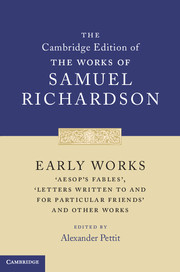Book contents
- Frontmatter
- Dedication
- Contents
- General Editors’ Preface
- Acknowledgements
- Chronology
- List of Abbreviations
- General Introduction
- Textual Introduction
- The Apprentice’s Vade Mecum (1733)
- A Seasonable Examination of the Pleas and Pretensions (1735)
- Preface to Aubin, A Collection of Entertaining Histories and Novels (1739)
- Aesop’s Fables (1739)
- Letters Written to and for Particular Friends (1741)
- Six Original Letters Upon Duelling (1765)
- Appendix: The Infidel Convicted (1731)
- Postscript
- Emendations
- Word-division
- Bibliographical Descriptions of Early Editions
- Explanatory Notes
- Index
Letter XLVIII
Published online by Cambridge University Press: 30 June 2022
- Frontmatter
- Dedication
- Contents
- General Editors’ Preface
- Acknowledgements
- Chronology
- List of Abbreviations
- General Introduction
- Textual Introduction
- The Apprentice’s Vade Mecum (1733)
- A Seasonable Examination of the Pleas and Pretensions (1735)
- Preface to Aubin, A Collection of Entertaining Histories and Novels (1739)
- Aesop’s Fables (1739)
- Letters Written to and for Particular Friends (1741)
- Six Original Letters Upon Duelling (1765)
- Appendix: The Infidel Convicted (1731)
- Postscript
- Emendations
- Word-division
- Bibliographical Descriptions of Early Editions
- Explanatory Notes
- Index
Summary
The Father's Answer, setting forth the Inconveniencies and Disgrace attending the Profession of a Player.
Dear Gilbert,
I should be glad to have you in any Situation, which would afford you a comfortable and reputable Subsistence: But cannot think the Life of a Stage-player proper for that End. You must consider, that tho’ in the gay Trappings of that Employment a Man may represent a Gentleman, yet none can be farther from that Character if a perpetual Dependence be the worst Kind of Servility. In the first Place, the Company you will be in a manner obliged to keep, will be such as will tend little to the Improvement of your Mind, or Amendment of your Morals: To the Master of the Company you list in, you must be obsequious to a Degree of Slavery. Not one of an Audience that is able to hiss, but you must fear; and each single Person you come to know personally, you must oblige on every Occasion that offers, to engage their Interest at your Benefit. A Thought the most shocking to a free and generous Mind! And if to this you add the little Profit that will attend making a low Figure on the Stage, and, besides the Qualifications necessary, the incredible Fatigue attending the Support of a good Figure upon it; you will easily see, that more Credit, more Satisfaction, more Ease, and more Profit, may be got in many other Stations, without the mortifying Knowledge of being deem’d a Vagrant by the Laws of your Country. I hope this will be enough to dissuade you from farther Thoughts of the Stage: And, in any other Employment, you may, yet, expect some small Assistance from
Your loving Father.
- Type
- Chapter
- Information
- Early Works'Aesop's Fables', 'Letters Written to and for Particular Friends' and Other Works, pp. 376 - 377Publisher: Cambridge University PressPrint publication year: 2011



